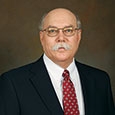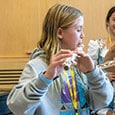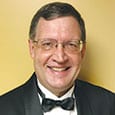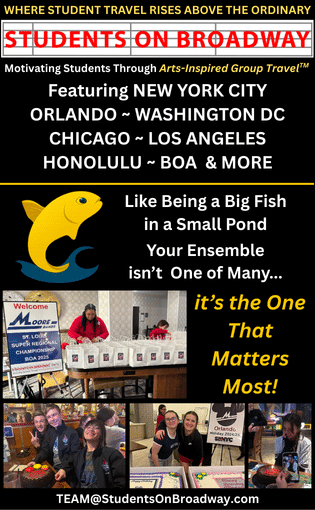Many school directors express frustration with the lack of interest and support for their program from other faculty members and school employees. Comments such as, “No one is interested in what the band does” or “Win or lose, the sports teams get all the attention while the band never gets any recognition,” are common in some schools, occasionally turning directors into outsiders in their place of work.
.jpg)
There are many reasons for this problem and just as many solutions, if directors are willing to be creative in making themselves and the band program an integral part of school life. A large part of the problem is that many music departments are, out of necessity, located far from other classrooms because of the volume of sound during rehearsals. This physical distance alone contributes to the isolation some directors have from their school colleagues.
A director colleague of mine who taught in a neighboring school would brag about his teaching schedule and the location of the band room. “I teach only two classes a day,” he would say, “and because the band room is on the other side of the building from the main office and classrooms, I can come and go as I please. Some days I don’t even see my principal or the other teachers.”
When you don’t see your colleagues, they don’t see you, and as a consequence they don’t get to know who you are or what you do. Although the freedom my friend described may seem attractive, the implications are detrimental to building and maintaining a strong instrumental music program. Here are some tips that will help directors make their programs more visible and increase interest and support in the band program from school colleagues.
1. Attend every single faculty meeting. During the first week of my first teaching job, the school principal offered to excuse me from after-school teachers’ meetings if I had scheduled a band rehearsal. He also excused the coaching staff from meetings.
At first I was delighted to avoid sitting through these sessions about curriculum, school dances, and discipline problems. My attitude was that I was the band director, and what I did was entirely different than what everyone else did.
Two months later I realized there were teachers in the hallway whose names I did not know, and I felt like a stranger in the teachers’ work room and lounge. I changed my rehearsal schedule to accommodate the meetings and immediately felt more engaged as a school faculty member. Getting to know my colleagues and learning more about the difficulties they faced gave me an entirely different perspective on the culture of public school education.
2. Eat lunch with fellow teachers, not alone in the band office. Walking to the school cafeteria and having lunch with other faculty is a great way to get to know your colleagues, and it’s a wonderful opportunity to educate them as to exactly what you do as a band director. If possible, occasionally stop by the teachers’ work room or teachers’ lounge to meet faculty who you don’t see at lunch. The objective is to get to know every faculty member by name, the classes each teaches, their hobbies, or favorite sports teams. You want to be able to have a meaningful conversation with each colleague.
3. Get to know administrators. I made a point of speaking to both the principal and assistant principal at my school every single day, and I kept them apprised as to every aspect of the band program. At meetings I shared contest and festival comment sheets and recordings with them. I wanted them to understand that these adjudicated performances were valuable educational opportunities for the band members and also improved my teaching. I wanted it to be clear that these activities were educational and not about winning trophies.
4. Volunteer to monitor a study hall or cafeteria, or accept hall duty to increase your visibility. We all know directors who find ways to get out of these responsibilities, even though volunteering is a good way to demonstrate to your colleagues that you pull your share of the load. Most schools require teachers to do these types of activities, so there is no reason why a director should not. I viewed these assignments as opportunities to recruit. In some years I recruited nearly the entire flag line for marching season from students who were in a study hall I monitored or met while I was on cafeteria duty.
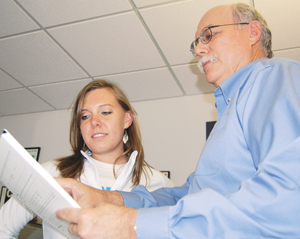
5. Devise creative ways to collaborate with other faculty. One obvious way to include other faculty in band activities is to occasionally program music that parallels material being studied in a class. If the school’s history classes are studying life in early America, have the band perform a concert featuring early American folk music. Prior to the program, attend the classes and talk about the composers and arrangers, and share some background information about the pieces being performed; be sure to invite the class members to attend.
6. Talk to history teachers and offer to give an occasional music history lecture to their classes related to material they are studying. Music can bring history lessons to life. Providing your knowledge as a guest lecturer will give other faculty members and students a chance to see you in a different way – as a scholar in addition to being a conductor and performer.
Collaborations with English teachers can be exceptionally interesting. If a class is studying poetry, offer to present a songwriting workshop. There are several ways to do this, even if you are not an accomplished songwriter. Pick an existing piece of music and ask the class to write original lyrics, or create song-writing teams of musicians and nonmusicians. You can expand the idea even further by teaming up with an English teacher to write an original song. Students and teachers will enjoy any of these experiences, especially because most people are fascinated with the art of songwriting.
7. Build good relationships with the athletic department and individual coaches. Far too many schools foster a band versus sports mentality, fueled by the attitudes and egos of band directors and athletic coaches. Each group is often overly concerned with protecting its turf. It takes work to build relationships where well-established divisions exist, but it is possible.
Some obvious ways to foster good relationships are to volunteer to work at sporting events, perhaps as a ticket taker or scorekeeper, and invite coaches to distribute programs at band concerts. A small ensemble from the music department might perform at athletic events, such as for important games against school rivals where bands are usually not present.
In return a coach could bring his team to a band concert or competition. I fondly remember an important marching competition where one of my bands earned top honors. Cheering the band on were students and coaches from nearly every fall sports team, including members of the football team who attended wearing their jerseys.
8. Think of creative ways to include administrators and faculty members in the band’s performances. Art teachers might welcome the idea of displaying their students’ work at concerts, and English teachers might appreciate an offer to include original poetry or short-story readings between music selections at your next concert. Your principal or superintendent might be interested in taking conducting lessons from you, followed by a spot on the next concert to conduct a march or the school fight song.
The most enjoyable concerts that drew the biggest crowds for me, were those that included faculty performing in the band. Once I realized that many teachers had some level of band experience and would enjoy sitting in with the band on a selection, the rest was easy.
A few weeks prior to the performance, I issued an open invitation to all teachers to perform a selection with the band. It was safest to program a fairly easy piece to get certain important faculty members to participate. I can still recall the smile on the football coach’s face as he made his concert debut playing the triangle. No doubt, every person in the standing-room-only auditorium that night still remembers it, too.
When forging relationships, never forget the non-teaching school staff. Get to know the school office staff because these people are of great value in preparing concert programs, helping in various public relations efforts, and making contacts with community leaders and various businesses. It has been my experience that long-time school secretaries literally know everyone in the school and community.
Always remember, however, that any working relationship is a two-way street and that secretaries often need help. If you see that the school secretaries are overwhelmed with phone calls or student requests at a certain time of the day, offer to help by answering the phone or checking in late students.
Develop a solid relationship with school guidance counselors and meet with them to learn about graduation requirements and college admission standards. Most directors know the frustration of learning that a valued student musician does not have time in his schedule for band because of another class he has to take. It is important to work with your students to plan their class schedules so they stay in band throughout high school. You might even consider inviting a guidance counselor to address the band each year to discuss scheduling strategies.
Get to know the school custodians. My students and I took pride in the appearance of the band room and appreciated the custodians’ extra efforts to keep the area in great shape. Students had to reorganize the band room every day after rehearsal – every instrument and every music stand had to be in its place. It was small gesture that the custodians appreciated because they did not have to pick up after students or move band equipment. We also communicated with the custodial staff in anticipation of parent meetings or special guests in the room. Ultimately, they took as much pride as we did in having the space polished and presentable.
Some of the most valuable people in a school district are the bus drivers. I always tried to find drivers who were genuinely interested in the band and routinely bought them admission tickets to every event we traveled to. I also impressed on students the importance of cleaning up the buses at the end of a trip as well as always thanking the drivers for their time.
Many students developed friendships with the drivers and even began to ask certain ones if they were going to drive to upcoming performances. Over time, many drivers stopped requesting payment for their services, and some accepted payment and then donated it back to the band. Regular drivers truly became part of our band family.
On one occasion when the high school marching band played on the field as part of opening day ceremonies at a local minor league baseball stadium, the band was allowed to select someone from school to throw out the first pitch. The choice for this honor was an easy one: a veteran bus driver who had driven the school’s sports teams and bands around the state for almost 40 years. Nearly every bus driver in the school district was in attendance that day to see this gentleman throw that pitch.
One of the most memorable – and meaningful – performances of my life was a command performance at the request of a high school principal. It took place several years ago when I had the good fortune to work with a dedicated group of young people who had just won the school’s first major marching band championship. The principal, who attended that day, asked if the band would perform the competition show the following week for the entire student body.
The performance was an unforgettable experience for everyone. As the band marched into the stadium, I saw the packed stands and realized the band program was truly an integral part of the life at this school. Everyone was there – the entire student body, administrators, teachers, guidance counselors, office workers, coaches, custodians, cafeteria workers, and bus drivers – to see the band. The school building was basically empty. All of these people were in that stadium because of the pride they felt in the band. Everyone shared in the thrill of the band’s achievement.
Band directors whose top priorities include creating programs that are visible beyond the music department and building strong relationships with school colleagues can have a similar outcome. Understand though, it does not happen overnight. The command performance I described was years in the making.
One of the most important ingredients in this effort is sincerity. There has to be a genuine, heartfelt interest in building strong, positive relationships with other school colleagues, which is difficult considering the day-to-day challenges that consume most directors. After the work that goes into creating the high-quality performances that earn first-place awards and superior ratings, it is important to remember that years from now, memories of personal relationships and the music that was the basis for them will be just as important – perhaps more important – than those trophies and ratings.
In many ways the true measure of a strong music program can be defined by the strength of the relationships that were forged during the program’s journey to success.

